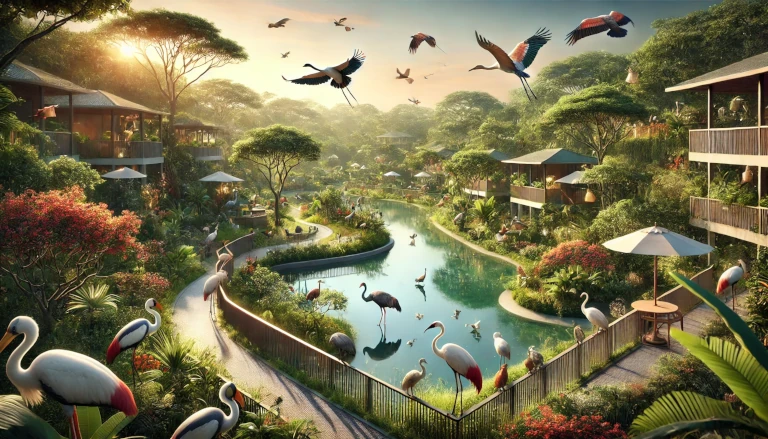Private Bird Sanctuary: A Haven for Conservation and Enjoyment 🦜🌿
Creating a private bird sanctuary offers an exciting opportunity for nature lovers and conservationists to protect bird species and enhance biodiversity. With a private sanctuary, you’re not just building a natural space; you’re creating a refuge where birds can thrive and visitors can connect with nature. This guide provides comprehensive details on why, how, what, where, when, and financial requirements for establishing a private bird sanctuary, along with the benefits and potential challenges involved.
What is a Private Bird Sanctuary? 🌲🦅
A private bird sanctuary is a protected area established on private land, dedicated to the preservation and observation of bird species. Unlike public sanctuaries, a private sanctuary offers greater control to the owner, who can create specific habitats and implement conservation practices that suit the local ecosystem. These sanctuaries play a crucial role in protecting endangered species, promoting biodiversity, and providing educational and recreational opportunities.
Why Create a Private Bird Sanctuary? 🌍❤️
Building a private bird sanctuary has several important benefits. It offers a haven for bird species threatened by habitat loss and helps maintain the natural balance in the ecosystem. A sanctuary also serves as a peaceful retreat, where people can enjoy birdwatching and connect with nature. For conservationists, it’s an impactful way to contribute to biodiversity, and for landowners, it can enhance the aesthetic and ecological value of their property.
How to Establish a Private Bird Sanctuary? 🛠️🐦
Step-by-Step Guide:
- Select Suitable Land: Choose a location that can support diverse bird species and provides adequate food, water, and shelter.
- Research Local Species: Understanding native bird species and their needs is essential for creating a habitat that supports their lifestyle.
- Develop the Habitat: Plant native trees, shrubs, and flowering plants to attract birds. Include water features like ponds or bird baths.
- Implement Conservation Practices: Control pesticide use, set up feeding stations, and install nest boxes to support nesting.
- Create Viewing Areas: Designate areas where visitors can observe birds without disturbing them.
Where Should You Establish a Private Bird Sanctuary? 🏞️
A private bird sanctuary can be established on any suitable land with natural elements, such as fields, forests, or even larger backyards. Ideal locations have a mix of open spaces and natural vegetation, providing food sources and shelter for birds. Rural areas with low pollution and limited human disturbance are ideal, as birds are more likely to thrive in undisturbed habitats.
When is the Best Time to Start a Private Bird Sanctuary? 🌱⏳
The best time to start preparing a bird sanctuary is during the early monsoon season, as this allows plants to establish and provide shelter and food sources. For maintenance, spring is ideal for planting flowering plants, while fall is suitable for pruning and preparing the habitat for winter. Bird sanctuaries can take a few years to fully develop, as trees and shrubs need time to grow and create a stable ecosystem.
Financial Requirements for a Private Bird Sanctuary 💰
The cost of setting up a private bird sanctuary varies depending on the size of the land, type of habitat you wish to create, and ongoing maintenance. Here’s a breakdown of potential costs:
- Land Preparation: Clearing and landscaping costs range from ₹50,000 to ₹1,50,000, depending on the area and existing vegetation.
- Plants and Trees: Native plants, shrubs, and trees can cost ₹10,000 to ₹50,000 based on selection.
- Water Features: Installing ponds or water systems can range from ₹20,000 to ₹1,00,000, depending on complexity.
- Maintenance: Ongoing expenses include food supplies, pest control, and maintenance of nesting areas, typically ₹5,000 per month.
Benefits of Creating a Private Bird Sanctuary 🌼💚
- Conservation of Bird Species: Provides a safe space for endangered and migratory birds.
- Promotes Biodiversity: Attracts other wildlife and plants, enhancing the ecosystem.
- Educational Opportunities: Offers a place for local schools and researchers to study birds and nature.
- Aesthetic Value: Improves the beauty of the landscape, making it a tranquil escape for nature lovers.
Limitations and Challenges of a Private Bird Sanctuary ⚠️
Creating and maintaining a private bird sanctuary comes with challenges. These include high initial costs for setup, the need for consistent maintenance, and potential conflicts with nearby human activity. Additionally, bird sanctuaries are susceptible to natural threats like pests and weather events. Legal requirements, such as obtaining permission to attract and house certain species, can also be a hurdle for new sanctuary owners.
A Lasting Impact on Nature and Conservation 🌏🕊️
Establishing a private bird sanctuary is an enriching endeavor that combines conservation with personal fulfillment. With a well-planned setup, financial investment, and commitment to conservation practices, you can create a safe space that nurtures bird populations and brings people closer to nature. Whether for conservation, education, or enjoyment, a private bird sanctuary has the power to positively impact the environment and foster a deeper appreciation for wildlife.
A private bird sanctuary provides a dedicated habitat for bird species, supporting biodiversity while offering a tranquil escape and conservation space. 🦜
Discover more from Green Ecosystem - Renewable Energy, Agriculture, and Environmental Sustainability
Subscribe to get the latest posts sent to your email.


